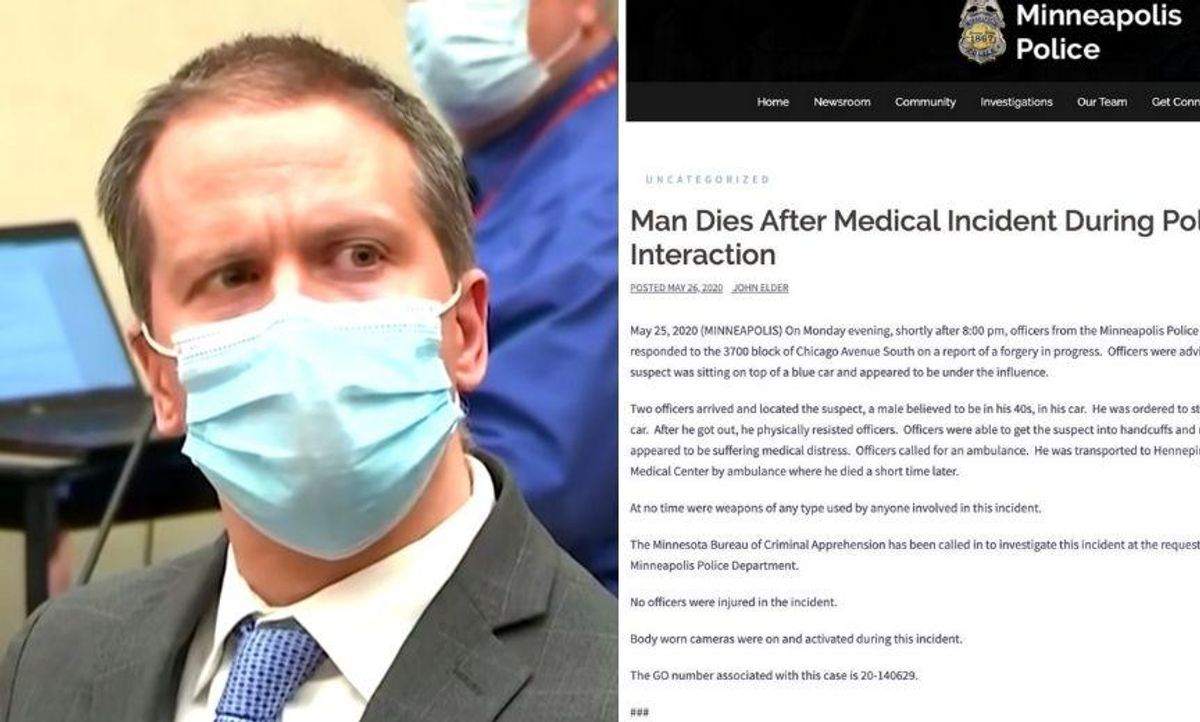minneapolis
Top stories
Minneapolis Police's Initial Misleading Statement on George Floyd Murder Gets Renewed Scrutiny After Verdict
In Minnesota last summer, officer Derek Chauvin murdered George Floyd, an unarmed Black man whose death sparked nationwide protests and accelerated America's centuries-long reckoning with its law enforcement systems disproportionately targeting Black Americans.
Chauvin knelt on Floyd's neck for nearly 10 minutes, as bystanders implored the officer to stop and as Floyd repeatedly said he couldn't breathe. After calling for his mother, Floyd went silent. Chauvin continued putting his full weight on Floyd's neck for at least another three minutes.
Nearly a year later—this past Tuesday—Chauvin's trial concluded with the jury finding him guilty on all counts, including second and third degree murder charges. The jury reached the unanimous decision after less than a day of deliberation, signaling that—for those tasked with assessing the charges and evidence against Chauvin—the case was open and shut.
Now, the Minneapolis Police Department's official description of the murder in the immediate aftermath is under heightened scrutiny.
Seriously, read it again knowing what we know: https://t.co/XqPWCpoxeQ— Jake Tapper (@Jake Tapper) 1618954787.0
Claiming Floyd died of a "medical incident," the release went on to say:
"Two officers arrived and located the suspect, a male believed to be in his 40s, in his car. He was ordered to step from his car. After he got out, he physically resisted officers. officers were able to get the suspect into handcuffs and noted he appeared to be suffering medical distress. Officers called for an ambulance. He was transported to Hennepin County Medical Center by ambulance where he died a short time later."
At no point does the press release mention that Floyd had a grown man's entire weight planted on his neck for nearly 10 minutes, or the repeated pleas from Floyd and bystanders for Chauvin to relent in his murder-in-progress.
The characterization of the murder sparked outcry in retrospect.
If a 16-year-old bystander didn’t have an iPhone camera, this is how George Floyd’s death would have been entered i… https://t.co/MHIPvzbB6Y— Frank Luntz (@Frank Luntz) 1618968453.0
Imagine how many police murders went unpunished because they were never recorded. https://t.co/LO8WfLmK8C— Vaush (@Vaush) 1618961252.0
Ugh...it's so infuriating to look at this, even now that some measure of justice and accountability has occurred. https://t.co/HpqVYmpoT5— Mason T. Becker (@Mason T. Becker) 1618961406.0
People warned journalists against reporting police statements as unequivocal fact—especially when the statements are about the department's own actions.
This was the original statement Minneapolis police put out about George Floyd’s death. Clearly, we in media need to… https://t.co/COcIhcP8oX— Joy-Ann Pro-Democracy & Masks Reid 😷 (@Joy-Ann Pro-Democracy & Masks Reid 😷) 1618964674.0
A case study to be taught in every journalism school and newsroom: Journalism is not stenography. We must verify ev… https://t.co/H3hvsgH8Xp— Kat Stafford (@Kat Stafford) 1619026330.0
One of the legacies of George Floyd’s murder should be that we cover this in every journalism, rhetoric, civics, Am… https://t.co/71omtVv1IX— Pamela Colloff (@Pamela Colloff) 1619016403.0
Reporters, this case is EXACTLY why we must move past a police report being the end all be all in our reporting.… https://t.co/2ThH58rMes— Anthony Antoine (@Anthony Antoine) 1618955879.0
This is why the media world really needs to take a look at the crime beat and how we just write up every police rep… https://t.co/dEJh9KC7bj— Alexis Johnson (@Alexis Johnson) 1618960057.0
On Wednesday, Attorney General Merrick Garland announced the Justice Department would be investigating the policing practices in Minnesota
 SECONDNEXUS
SECONDNEXUS percolately
percolately georgetakei
georgetakei comicsands
comicsands George's Reads
George's Reads





